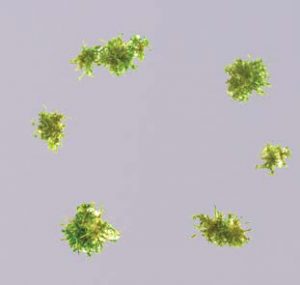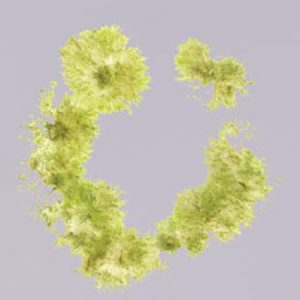Alexander Heyl, Ph.D., assistant professor of biology, exposes students to the rigors of his methodologies, providing them with invaluable access to his cutting-edge work.
Alexander Heyl, Ph.D., investigates new ways to combat disease and clean the environment
Alexander Heyl, Ph.D., assistant professor of biology, speaks about plant genetics the way a classical musician discusses their favorite concerto. Articulating his research with immense passion and precision, Dr. Heyl makes one thing clear: Plants have never been so fascinating.

Wild Moss
In 2001, Dr. Heyl began his research on a signaling pathway of a plant hormone called cytokinin, which is similar to a building block of DNA found in all organisms. He compares the concept of a signaling pathway to how humans respond to stimuli. “When we as humans see something, we react to it and get signals to our brain. For example, the eye is a receptor that recognizes light. In plants, a receptor sees the hormone and certain reactions in the cell happen.”
Even before joining the biology department faculty at Adelphi in 2015, Dr. Heyl was also interested in the practical applications of his work, from agriculture to insight into cancer and other illnesses. The plant biotechnology company Biogemma, for instance, is using results of his research to improve crop plants specifically for canola seed production.

Mutant Moss
Dr. Heyl currently studies the evolution of the pathway. “The signaling pathway used in plants for cytokinin is also very close to the pathway common in bacteria,” he explained. His findings may also be used as an aid in cleaning up oil spills and other contaminated sites. In a 2014 research analysis published in Plant Physiology, Dr. Heyl and his team found that “all the protein domains necessary for this signaling system are present in bacteria. During the course of plant evolution, these domains were then assembled in such a way that they could be used for signal transduction of the phytohormone cytokinin.”
While Dr. Heyl’s discoveries have already contributed a great deal to science, he continues to search for new ways to apply his research. He also exposes students to the rigors of his methodologies, providing them with invaluable access to his cutting-edge work. “When I was in Germany, there were several doctoral students working on our research, and one was focusing on a new kind of protein that interacts with DNA,” he said. “We were looking at what kind of proteins interact with DNA to have an effect in the cell.”
In addition, Dr. Heyl focuses on how these protein- DNA interactions can be identified in living plants. “It’s difficult to do this in a plant without destroying a plant itself,” he said. “We are working to transform the plants and let them grow into little seedlings. We measure the outcome with luminescence, which allows us to let the plant continue to grow after the testing.”
Fortuitously, this approach does not call for a large budget. “I find this research not only interesting, but cost effective,” Dr. Heyl said. “We don’t need to use very expensive equipment.” His research methodology includes the use of wet lab experiments as well as bioinformatics. A wet lab environment involves testing chemicals and biological matter in vitro and in vivo, whereas bioinformatics only uses computer sciences and software tools to analyze biological data.
Using these two approaches in tandem creates an interdisciplinary research experience, with many opportunities to engage in collaboration that otherwise might not exist. “I sent one of my students to a different lab in Holland, and she learned a tremendous amount there,” Dr. Heyl said. “This might sound funny, but it’s often difficult for scientists to communicate across different fields.”
Dr. Heyl’s more recent interests have expanded to synthetic biology, a field that focuses on engineering new DNA sequences—defined by the UK Royal Society as “an emerging area of research that can broadly be described as the design and construction of novel artificial biological pathways, organisms or devices or the redesign of existing natural biological systems.”
Synthetic biology offers Dr. Heyl another opportunity to reach across scientific boundaries. “Our research in the field of evolution of signaling pathways will help to give us knowledge to allow us to construct a new pathway,” he said. If his previous work is any indication, Dr. Heyl’s forthcoming research may very well have tremendous value for health, agriculture and the environment.
Alexander Heyl, Ph.D.’s primary area of research is on the evolution and function of signaling pathways. In particular, he is using wet lab experiments and bioinformatics analysis to discover the origin and the molecular mechanisms of a plant hormone called cytokinin. Dr. Heyl received his postdoctoral lecturer qualification from the Free University of Berlin in Germany in 2010.For further information, please contact:
Todd Wilson
Strategic Communications Director
p – 516.237.8634
e – twilson@adelphi.edu